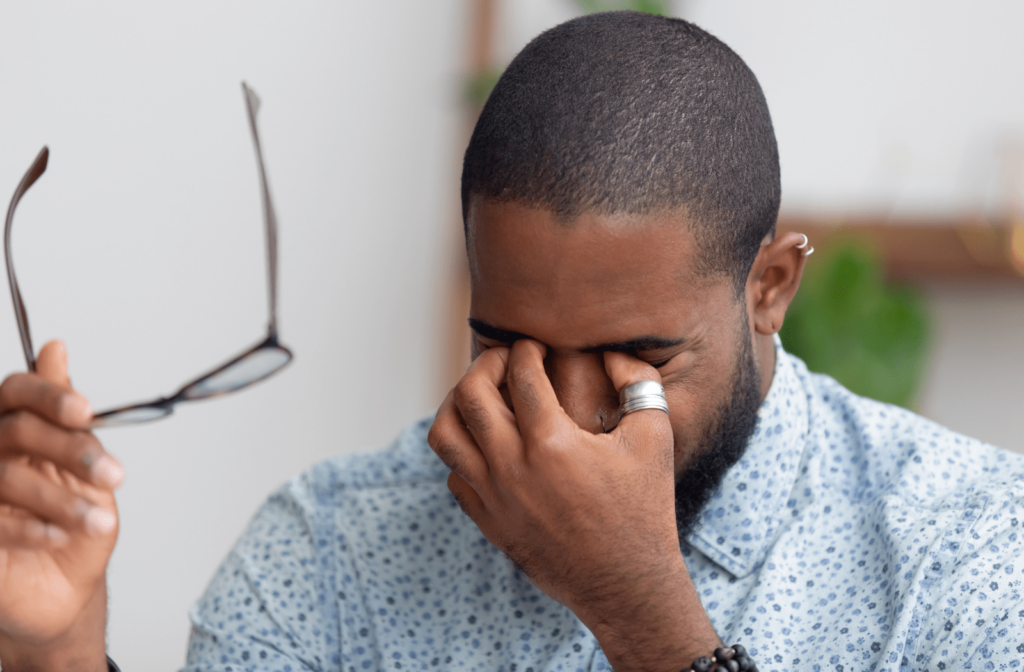Dry eyes are a fairly common condition that can cause pain and even vision loss. To reduce friction and keep vision sharp, the eye constantly produces tears. Some people, however, are unable to produce tears normally, or their tears evaporate too quickly. When this happens, it can result in pain and vision problems.
Chronic dry eye is a condition in which your eyes either don’t produce enough tears or produce tears of poor quality. It can be irritating and cause symptoms such as a gritty sensation in your eyes or redness, and you may constantly wake up with irritated eyes.
Dryness varies in severity from person to person. If you have a mild case of dry eye, you may dismiss it. However, if it doesn’t go away or appears to be getting worse, it’s time to seek further treatment.
Untreated Dry Eyes
Dry eyes may appear to be a minor, annoying, problem. Sure, your eyes are constantly itchy and red, but you can still see, so you can deal with it, right?
Unfortunately, dry eye is a disease that worsens over time. That means that if dry eyes aren’t treated, they’ll only intensify. This is how a severe case of untreated dry eye may affect you:.
Corneal Ulcers
A corneal ulcer is an open sore that develops on the cornea, your eyes’ clear, protective outer layer. While corneal ulcers are usually caused by an injury, they can also be caused by severe dry eye.
Debris, such as dirt and sand particles, enter your eyes daily and scratch the surface of the cornea. Bacteria can infect the scratch and cause an ulcer if your tear glands don’t produce enough tears to wash away the particles.
Conjunctivitis
Inflammation or infection of the conjunctiva, the clear layer of cells covering the white part of your eyeball and the inner surface of your eyelids, can result in contagious yellow discharge, as well as ocular pain and redness.
Keratitis
Keratitis is defined as corneal inflammation. It can be caused by a variety of infections, eyelid abnormalities, injury, or dry eye. Scarring or a corneal ulcer may result if the deeper layers of the cornea are involved, especially if left untreated.
Difficulty Wearing Contacts
Your eyes must produce enough tears for contact lenses to feel comfortable. Otherwise, your contact lenses may become overly dry. This can cause irritation, a gritty feeling, and redness.
Dry contact lenses can also adhere to your eyeball, making removal difficult. Chronic dry eye may prevent you from wearing your contacts because they need moisture. You might need to wear glasses instead.
Trouble Reading or Driving
Blurred vision may indicate that you need a stronger prescription for your glasses or contacts, but it may also be a sign of chronic dry eye syndrome.
If left untreated, blurriness or double vision may worsen over time. You may have difficulty driving and reading if this is the case. Additionally, working with blurred vision may be difficult, if not impossible.
How to Take Care of Dry Eyes
Fortunately, there are many over-the-counter options available to treat dry eyes before they become a serious health issue. However, it’s always a good idea to consult with your doctor to determine which treatments are appropriate for you.
Avoid Blowing Air in Your Eyes
Air conditioners and heaters are major causes of dry eyes. When you’re inside or driving, keep fans away from your eyes. When it’s windy outside, wear protective eyewear such as sunglasses. Consider using an eye mask or a humidifier if you sleep with a heater or fan on at night. Ceiling fans are major contributors to dry eyes.
Take Eye Breaks
While reading or looking at a computer or smartphone, we tend to blink less frequently. Make a conscious effort to blink more often or stop periodically to close your eyes for a few minutes if you’re doing tasks that require more visual concentration.
Eye Drops
Artificial tears are eyedrops that are used to moisturize and lubricate the outer surface of your eyes. These eyedrops can be used to treat dry eyes caused by ageing, medications, hormonal changes, eye surgery, or environmental factors such as windy or smoky environments.
Artificial tears are available over the counter. No single type of eye drops are the best at treating dry eyes. You may need to try a few different brands before you find the one that works best for you.
There are also eye drops that promote healing and reduce tear evaporation, as well as those that contain thickening agents to keep your eyes lubricated and happy for longer.
Treat Dry Eye with Your Optometrist
If you don’t want to deal with these issues as a result of untreated dry eye, you can treat it. It may be as simple as making a few lifestyle changes or combining several treatment options.
As always, your first priority should be to prevent the problem from occurring in the first place. Humidifiers can help you increase the moisture in your home. You could also use an air purifier to reduce irritants.
Dry eyes can be easily treated in some cases by staying hydrated. You can determine your dry eye prevention strategy by making an appointment with Toronto Centre Eye Care.




